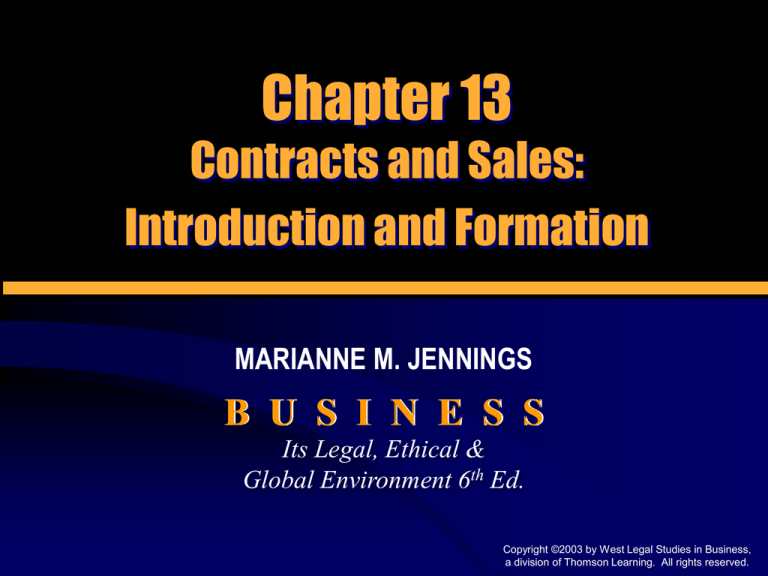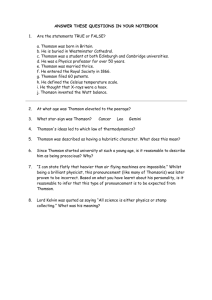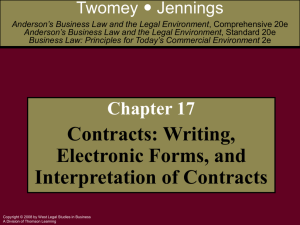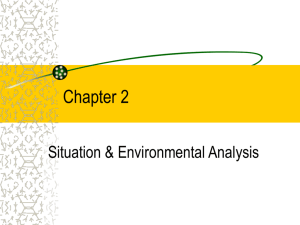
Chapter 13
Contracts and Sales:
Introduction and Formation
MARIANNE M. JENNINGS
B U S I N E S S
Its Legal, Ethical &
Global Environment 6th Ed.
Copyright ©2003 by West Legal Studies in Business,
a division of Thomson Learning. All rights reserved.
What is a Contract?
“A Contract is a promise (or set of
promises) for breach of which the law
gives a remedy.”
• Defined in Restatement (Second) of
Contracts—American Law Institute (ALI)
2
Copyright ©2003 by West Legal Studies in Business,
a division of Thomson Learning. All rights reserved.
Sources of Contract Law
Common Law
Based on English common law
Summarized in Restatement (Second) of
Contracts
Applies to contracts with subject matters
of land or services
• Examples: Mortgage, lease or medical
services
3
Copyright ©2003 by West Legal Studies in Business,
a division of Thomson Learning. All rights reserved.
Sources of Contract Law
Uniform Commercial Code (UCC)
Drafted by ALI and National Conference of
Commissioners on Uniform State Laws
• Common law is not uniform from state to state
• First appeared in 1940s
• Adopted in part or whole in all states
Article 2 governs contracts for the sale of goods
• More liberal than common law
4
Copyright ©2003 by West Legal Studies in Business,
a division of Thomson Learning. All rights reserved.
Sources of Contract Law
Case 13.1 Cook v. Dowing (1995)
Was the dentist a merchant?
Did the fitting for dentures constitute a
sale of goods?
What public policy issues does the
dissenting judge raise?
5
Copyright ©2003 by West Legal Studies in Business,
a division of Thomson Learning. All rights reserved.
Sources of Contract Law
Uniform Commercial Code (UCC)
Article 2A leases
• New addendum to UCC
• Covers leases of goods—long-term leases
such as car leases
• Adopted in about ten states
6
Copyright ©2003 by West Legal Studies in Business,
a division of Thomson Learning. All rights reserved.
Types of Contracts
Bilateral vs. Unilateral Contracts
Bilateral: First party (offeror) makes a promise
in exchange for the second party’s (offeree’s)
promise
• Example: You promise to pay back money with
interest and the bank promises to loan you the money
Unilateral: First party (offeror) makes a
promise in exchange for offeree’s performance
• Example: “Drive my car across the country and I’ll
pay you $500 plus expenses”
7
Copyright ©2003 by West Legal Studies in Business,
a division of Thomson Learning. All rights reserved.
Types of Contracts
Express vs. Implied
Express contracts are written or oral agreements
Implied-in-fact contracts are non-spoken, nonwritten understandings
• Example: When you go into a doctor’s office, you
have an implied contract to pay her for her services
even though you may not sit down and organize the
details
8
Copyright ©2003 by West Legal Studies in Business,
a division of Thomson Learning. All rights reserved.
Types of Contracts
Implied-in-Law (Quasi Contract)
Fictional Contract created by a court
Elements:
• one party confers a benefit on another
• Both are aware of the benefit and
• Retention of the benefit without
compensation would be unfair and unjust.
9
Copyright ©2003 by West Legal Studies in Business,
a division of Thomson Learning. All rights reserved.
Types of Contracts
Void, Voidable and Void
Void contracts are ones to do something illegal
or against public policy—neither side can
enforce
• Example: Contract to buy drugs
Voidable contracts are contracts in which one
party has the right to end the contract
• Example: Contracts of minors are avoidable
Void Contracts are illegal and do not exist at
law!
10
Copyright ©2003 by West Legal Studies in Business,
a division of Thomson Learning. All rights reserved.
Types of Contracts
Executed vs. Executory
Executed contract is one in which the promises
under the contract have been performed
Executory contract is one that has been entered
into but not yet performed
Contracts can be partially executory/executed if
one side has performed
11
Copyright ©2003 by West Legal Studies in Business,
a division of Thomson Learning. All rights reserved.
Formation of Contracts
12
Copyright ©2003 by West Legal Studies in Business,
a division of Thomson Learning. All rights reserved.
Formation of Contracts
Offer is the first part of the contract
Parties
• Offeror = person who makes offer
• Offeree = person who receives offer
Must have language that indicates intent to
contract
• Not just inquiry
• More than negotiation
• Courts use an objective, not a subjective, standard
13
Copyright ©2003 by West Legal Studies in Business,
a division of Thomson Learning. All rights reserved.
Formation of Contracts
Case 13.2
Leonard v. Pepsico
(2000)
Was the commercial an offer for a Harrier
Jet?
What was the acceptance?
Does the commercial satisfy the statute
of frauds?
14
Copyright ©2003 by West Legal Studies in Business,
a division of Thomson Learning. All rights reserved.
Formation of Contracts
Offer
Under common law offer must contain essential
terms of the contract
•
•
•
•
•
Parties
Subject matter of the contract
Price and Payment Terms
Delivery Terms
Performance Times
Under UCC Article 2 offer need only contain the
parties, the subject matter and quantity
15
Copyright ©2003 by West Legal Studies in Business,
a division of Thomson Learning. All rights reserved.
Formation of Contracts
Offers
Under the UCC, the court can consider industry
custom and course of dealing in determining
whether terms are sufficient.
Communication to offeree
Offeree cannot accept offer that never arrives
Ads are generally considered invitations for
offers—not offers
16
Copyright ©2003 by West Legal Studies in Business,
a division of Thomson Learning. All rights reserved.
Formation of Contracts
Termination of an Offer by Revocation
Offer can be revoked any time prior to
acceptance
• Exception is option
• Offeror is paid to hold offer open
• It is a separate contract for time
UCC merchant’s firm offer UCC 2-205
• Offer by merchant signed in writing states it will be
kept open (irrevocable) for period stated (maximum
of three months)
17
Copyright ©2003 by West Legal Studies in Business,
a division of Thomson Learning. All rights reserved.
Formation of Contracts
Termination of an Offer by Rejection
Offeree indicates “no”
Rejection by changes in terms—counteroffer
Termination by counteroffer - UCC 2-207
Non-merchants-addition of terms in acceptance
does not equal a counteroffer. Acceptance
results but additional terms are not part of
contract
18
Copyright ©2003 by West Legal Studies in Business,
a division of Thomson Learning. All rights reserved.
Formation of Contracts
Termination by counteroffer - UCC 2-207
Merchants --‘battle of the forms’
Acceptance with additional terms = contract
Additional terms are part of contract unless:
• Material—price, warranties (immaterial = shipment
or payment terms)
• Offer limited—“This offer is limited to these terms”
• Objection to new terms
19
Copyright ©2003 by West Legal Studies in Business,
a division of Thomson Learning. All rights reserved.
Formation of Contracts
UCC Rules for Acceptance of Additional Terms
20
Copyright ©2003 by West Legal Studies in Business,
a division of Thomson Learning. All rights reserved.
Formation of Contracts
Case 13.3
Schulze and Burch Biscuit
Co. v. Tree Top, Inc. (1987)
Is arbitration a ‘material’ change?
Was the offer limited to the terms of the offer?
Termination by Offer Expiration
Time for offer expires
Every offer expires (lapses) after a reasonable
time
21
Copyright ©2003 by West Legal Studies in Business,
a division of Thomson Learning. All rights reserved.
Formation of Contracts
Acceptance: Offeree’s Response
Offeree’s positive response
Must be communicated to offeror
Using proper means of acceptance
Only offeree has power to accept
22
Copyright ©2003 by West Legal Studies in Business,
a division of Thomson Learning. All rights reserved.
Formation of Contracts
Acceptance: Offeree’s Response
The mailbox rule
• Timing rule in contract acceptances that
provides that acceptance is effective upon
mailing if properly done.
Acceptance by stipulated means
• Mailbox rule applies
• If offeree does not use means stipulated, then
counteroffer and/or rejection
23
Copyright ©2003 by West Legal Studies in Business,
a division of Thomson Learning. All rights reserved.
Formation of Contracts
Acceptance with no stipulated means
Mailbox rule if same means or stipulated
means used
Arrival if different (slower) method used
If non-stipulated means used, it is a
counteroffer and a rejection
24
Copyright ©2003 by West Legal Studies in Business,
a division of Thomson Learning. All rights reserved.
Formation of Contracts
Case 13.4
Cantu v. Central
Education Agency (1994)
Who was the offeror?
Does the UCC apply in this case?
What is the distinction between the Davis
case and the McKinney case?
25
Copyright ©2003 by West Legal Studies in Business,
a division of Thomson Learning. All rights reserved.
Formation of Contracts
E-Commerce and Contract
Formation
Formation by ‘Clickon’, ‘Clickthrough’
or ‘Clickwrap’ agreements.
Offeree agrees to terms contained in an
online agreement.
Offeree accepts by clicking the “I Agree”
button.
26
Copyright ©2003 by West Legal Studies in Business,
a division of Thomson Learning. All rights reserved.
Formation of Contracts
Case 13.5
Mortenson v. Timberline
(2000)
When did Mortenson agree to the limitation on
damages?
How does the liability limitation square with
UCC 2-207?
Is the damage limitation clause
unconscionable?
27
Copyright ©2003 by West Legal Studies in Business,
a division of Thomson Learning. All rights reserved.
Formation of Contracts
Consideration
Distinguishes gifts from contracts
The bargained-for exchange
• What each party is willing to give up for the
other parties promise
• Courts are not concerned with the adequacy
of consideration, only the legal sufficiency
of consideration
28
Copyright ©2003 by West Legal Studies in Business,
a division of Thomson Learning. All rights reserved.
Formation of Contracts
Consideration
Unique consideration issues
• Charitable subscriptions are enforceable
even though detriment is one-sided
• Reliance (promissory estoppel) provides
element of detriment for contracts not yet
begun
29
Copyright ©2003 by West Legal Studies in Business,
a division of Thomson Learning. All rights reserved.
Formation of Contracts
Contract Form: When Writing is Required
Statute of Frauds (1677) controls what must be
written
Types for contracts
•
•
•
•
Real property
Contracts that can not be performed in one year
Contracts to pay the debt of another
UCC-contracts for sale of goods for $500 or more
30
Copyright ©2003 by West Legal Studies in Business,
a division of Thomson Learning. All rights reserved.
Formation of Contracts
Statute of Frauds: Exception
Performance
What Form of Writing is Required?
Need not be one formal document—can
be pieced together
Merchant’s confirmation memorandum2-201
31
Copyright ©2003 by West Legal Studies in Business,
a division of Thomson Learning. All rights reserved.
Formation of Contracts
Case 13.6
Rosenfeld v. Basquiat
(1996)
Did the contract comply with the statute
of frauds?
What is the effect of not complying with
the statute of frauds?
Was the writing void?
32
Copyright ©2003 by West Legal Studies in Business,
a division of Thomson Learning. All rights reserved.
Formation of Contracts
The Writing Requirement in the
Electronic Contract
Allows for the identification of
electronically transferred documents
using encryption technology
Digital signatures help authenticate users
E-SIGN and UETA
33
Copyright ©2003 by West Legal Studies in Business,
a division of Thomson Learning. All rights reserved.
Formation of Contracts
The effect of the Written Contract:
Parol Evidence
Contract reduced to its final and
unambiguous form cannot be
contradicted with extrinsic evidence
Exceptions include evidence on fraud,
misrepresentations, and ambiguities
34
Copyright ©2003 by West Legal Studies in Business,
a division of Thomson Learning. All rights reserved.
Issues in Formation of
International Contracts
UN’s Convention on Contracts for the
International Sale of Goods (CISG)
Adopted in 1980
United States has adopted
Party Autonomy Still Controlling in
International Contracts
Must Provide for Additional Risks
35
Copyright ©2003 by West Legal Studies in Business,
a division of Thomson Learning. All rights reserved.
Issues in Formation of
International Contracts
Case 13.7
Intershoe, Inc. v.
Bankers Trust (1991)
Is the memo a final writing?
What dangers would the court introduce
if orders such as this were contradicted
by oral testimony?
36
Copyright ©2003 by West Legal Studies in Business,
a division of Thomson Learning. All rights reserved.








